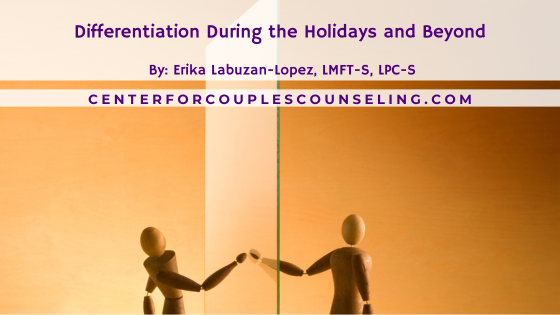Differentiation During the Holidays and Beyond
The holiday season is often portrayed as a time of togetherness, joy, and connection with family. However, for many couples, it can be a time filled with stress, conflict, and unmet expectations. Whether it’s navigating family traditions, managing financial stress, or simply spending more time in close quarters, the holidays can put a strain on even the healthiest relationships. One key concept and foundational relationship skill that can help couples not only survive but thrive during this season is differentiation.
What is Differentiation?
Differentiation is a fancy therapy word which refers to the ability to maintain a strong sense of self while staying emotionally connected to your partner. I like to think of it as a dashed line that separates you from another person, but also allows thoughts and feelings to move in and out. It’s about being able to hold onto your own beliefs, values, and desires, even when your partner’s views differ. It also means that your partner can be in a crappy mood without you succumbing to being in a crappy mood, too.
In highly differentiated relationships, couples are able to balance closeness and autonomy, allowing each partner to grow individually while staying connected as a unit. Differentiation is not about emotional distance or independence at the expense of intimacy; rather, it’s about being able to remain close to your partner without losing yourself in the process.
The Challenges of Differentiation During the Holidays
The holiday season can test a couple’s ability to maintain this balance. There’s often an increased focus on family traditions, some of which may differ between partners. One person may feel strongly about spending Christmas Eve with their extended family, while the other prefers a quieter evening at home. Financial stress, societal pressures, and the busyness of the season can also heighten emotions, making it harder to practice healthy communication and differentiation.
For example, when faced with a disagreement about how to spend the holidays, a less differentiated partner may either expect their partner to match them or give in to their partner’s wishes without voicing their own needs or become resentful, leading to conflict. Remember, if you say “yes” when what you meant is “no”, you are on the fastest path to developing deep resentments. On the other hand, a differentiated partner will be able to express their own desires clearly while remaining open to their partner’s perspective.
Strategies for Differentiation During the Holidays
Couples struggle with differentiation on a regular basis, and therefore it is something we work on often in couples therapy. I once heard on a podcast that the most practiced differentiated person can become instantly undifferentiated when walking into Thanksgiving dinner. So imagine adding relationship dynamics to family of origin issues, and you can see how easy it is to lose yourself in the mix. I encourage you to use these strategies with your partner and practice each skill in couples therapy as the holiday season becomes closer and closer.
1. Recognize Your Own Needs and Values:
Before you can communicate your desires to your partner, you need to be clear about what they are. Take some time to reflect on what’s most important to you during the holidays. Is it spending time with family? Creating new traditions? Relaxing and unwinding? Understanding your personal values will help you approach discussions with clarity and confidence.
2. Have Open, Honest Conversations Early:
Once you’ve identified your values, sit down with your partner to discuss your holiday plans. It’s essential to have these conversations early, before tensions build. Approach the conversation with curiosity and openness, aiming to understand your partner’s perspective rather than focusing solely on “winning” or getting your way. This creates space for compromise and collaboration.
3. Set Boundaries Without Guilt:
Boundaries are a key aspect of differentiation. It’s okay to say no to certain obligations or traditions that don’t align with your values. For example, if you need time to recharge after a busy week, it’s perfectly fine to skip a social gathering—even if it’s a long-standing tradition. Communicate your boundaries with kindness and clarity, and remember that setting limits does not mean you love your partner or family any less.
4. Allow Room for Flexibility and Growth:
Differentiation is not about rigidly sticking to your preferences at all costs. It’s about being able to adjust and adapt while staying true to yourself. The holidays can be a great time to practice flexibility and creative problem-solving. If your partner wants to spend time with their family but you prefer a quiet evening, perhaps you can compromise by visiting for a shorter period or taking turns with different traditions. The goal is to find solutions that honor both partners' needs.
Differentiation Beyond the Holidays
While the holiday season often intensifies relationship dynamics, the principles of differentiation are valuable year-round. Maintaining a strong sense of self within a relationship is crucial for long-term relationship satisfaction. When both partners are differentiated, they are able to handle disagreements with less defensiveness, communicate their needs more effectively, and support each other’s personal growth.
In everyday life, differentiation can show up in small moments: how you handle disagreements about chores, how you spend your free time, or even how you express your emotions. A highly differentiated couple doesn’t avoid conflict; rather, they approach conflict with curiosity and a willingness to understand each other without feeling threatened or overwhelmed.
The Role of Couples Therapy in Differentiation
If differentiation is a challenge in your relationship, couples therapy can provide valuable support. A skilled therapist can help you and your partner identify areas where differentiation is lacking and provide tools to improve communication, set boundaries, and develop a stronger sense of self within the relationship. This can lead to greater emotional intimacy and resilience, allowing you to navigate the ups and downs of life—holidays and beyond—with more ease.
By learning and practicing differentiation, you and your partner can foster a healthier, more fulfilling relationship that honors both your individuality and your connection as a couple.
My name is Erika Labuzan-Lopez, LMFT-S, LPC-S and I’m the owner of the Center for Couples Counseling. I love using a variety of techniques to help couples learn why they move into childish spaces during the conflict, how to put down those defenses for good, and what to do when you can’t access the tools you know will work to get out of conflict. I love working with couples and individuals to learn how to live in the world more relationally and engage in meaningful relationships. With over a decade of couples therapy experience, I am passionate about training and supervising therapists to become specialized in highly effective couples therapy. We see couples, individuals, and all residents of Texas online. Call (832) 827-3288 to schedule your FREE phone consultation.
Interested in Meeting a Couples Therapist in League City, TX?
If you want to improve your relationship and reconnect with your partner, take action now and start being more curious about your relationship. At Center For Couples Counseling, one of our skilled couples therapists can help you and your partner navigate your challenges and rediscover the curiosity and passion that brought you together in the first place. Don't wait any longer to invest in the health and happiness of your relationship. To meet with a couples therapist follow these three simple steps:
Contact us to schedule an appointment
Meet with one of our skilled couples therapists
Begin to find the curiosity in your relationship and reconnect with your partner!
Other Services Offered at Center for Couples Counseling
At Center For Couples Counseling, our team of skilled therapists understands that your relationship may be facing different challenges. In addition to couples therapy, our Texas practice offers individual therapy, infertility counseling, postpartum anxiety and depression counseling, therapy for self-care and burnout, and therapy for perfectionism. For more about us check out our FAQs and blog!









